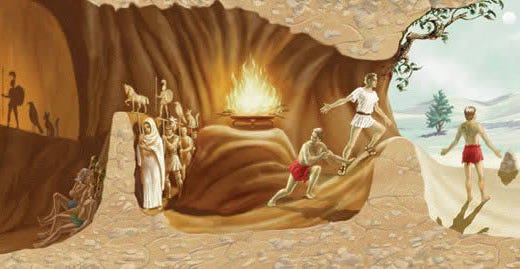Plato, Rothbard and the ill-fated Democracy
Anarcho-capitalism as a remedy for the degeneration of society.
Plato argues that democracy is a degeneration, as it can lead to tyranny, chaos, and disorder. He believes that democracy gives power to the masses, who are often ignorant and selfish, and that this can lead to bad decisions and oppression of the minority. For Plato, the only solution would be a philosophical government, led by the wise and virtuous, who would ensure the common good of society.
However, Murray Rothbard offers a different response to the problems of democracy. He argues that the state is a coercive institution that limits individual freedom and harms economic efficiency. For Rothbard, the removal of the state would allow the market and social relations to be based on voluntary agreements and private contracts, resulting in a freer, more prosperous, and just society.
Unlike Plato, who advocates for the leadership of the wise and virtuous, Rothbard believes that individual freedom is the fundamental value of a just and prosperous society. In an anarcho-capitalist society, individuals would have the freedom to make their own decisions and pursue their own interests, as long as they did not harm the freedom of others. The market would then be the means by which people communicate and make decisions, rather than relying on a centralized government.
Some criticisms of anarcho-capitalism argue that the lack of a centralized government could lead to an increase in violence and social instability, as well as the formation of oligopolies and monopolies in the market, harming free and fair competition. However, historical examples of anarchist societies, such as the medieval Italian city of Florence, suggest that it is possible to have a free and prosperous society without state intervention.
While anarcho-capitalism is not a consensual theory and there are still challenges to be overcome before an anarchist society can be successfully implemented, the theory offers an alternative to Plato's critique of democracy. Instead of advocating for the leadership of the wise and virtuous, anarcho-capitalism places individual freedom at the center of its philosophy, believing that a free and voluntary market is capable of ensuring a just and prosperous society.
References:
Plato. The Republic. Penguin Classics, 2003.
Rothbard, Murray N. For a New Liberty: The Libertarian Manifesto. Ludwig von Mises Institute, 2006.
Boaz, David. Libertarianism: A Primer. Free Press, 1997.
Carson, Kevin A. The Homebrew Industrial Revolution: A Low-Overhead Manifesto. BookSurge Publishing, 2010.



